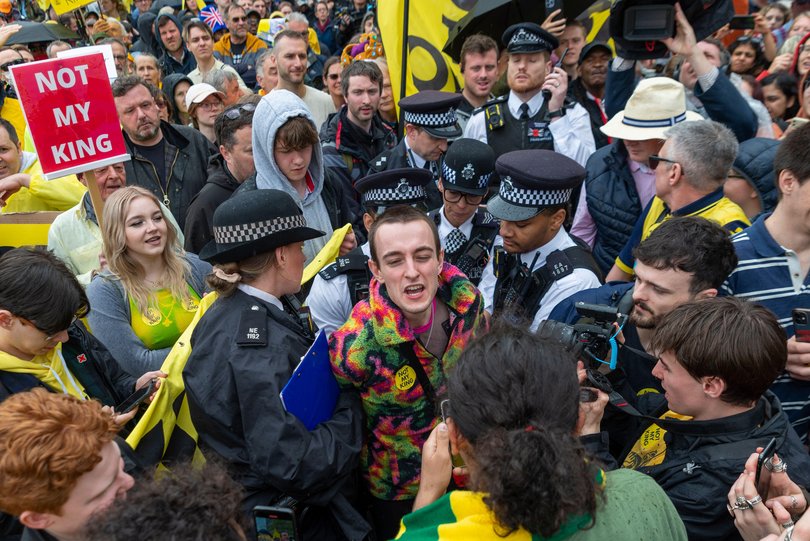Starmer can afford to reject Natalie Elphicke
With a steady 20-point lead, Labour should be comfortable turning down defectors who risk muddying the party's core values and contaminating it with Tory sleaze. "The effect is cumulative," warns one MP.
On Wednesday, Dover MP Natalie Elphicke has become the second Conservative MP to defect to the Labour party in a fortnight, criticising the “broken promises” of the government and citing her departure on housing policy and “the safety and security of our borders”.
Defections from a governing party are gold dust for the opposition. It’s a clear assertion that the government is failing and the ruling party is splintering. One departure can trigger a slow drip. Elphicke’s resignation - coming mere weeks after that of Dr Dan Poulter’s - has already created murmurings that more may be to come.
But the two defections are different. Poulter resigned over the government’s failures to fix the NHS. He said he couldn’t look his medical colleagues in the eye as a Conservative MP and that only Labour had a valid plan for the health service.
At first glance, Elphicke’s departure seems even more damaging for the Tories. Elphicke cited the security of UK borders - despite the recent successful passage of Sunak’s Rwanda legislation. Just last week, Tory colleagues were claiming that reports of asylum seekers pouring out over the Irish border were clear evidence that the scheme was working as a deterrent. Elphicke’s defection shows not all in the party are convinced.
But while the decision may damage Sunak, it does Starmer no favours either. Elphicke, unlike Poulter, is thoroughly of the Right. As a member of the right-wing New Conservatives group, she has demonised refugees and supported re-criminalising abortion in Northern Ireland. She voted against Labour proposals to outlaw "fire and rehire", and has backed a wide range destructive Tory legislation.
Her personal record leaves much to be desired, too. Elphicke has been widely scrutinised for her second job as chair of the New Homes Quality Board, appointed just months after she was made parliamentary private secretary in the department for Housing.
More seriously still, she was also found to have been among the MPs to have tried to unduly influence senior judges over her husband’s (Charlie Elphicke, the former Dover MP) - sentencing appeal, after he was convicted of sexual assault. Three MPs met consequences, Ms. Elphicke included, each given a one-day suspension.
Labour can afford to be selective. The party is maintaining a steady 20-point poll lead. Public opinion on Rwanda remains firm: many voters are opposed to the policy in principle, while the majority of those who do support it will only deem it successful should it stop the boats entirely - a near impossible hurdle to clear. Labour do not need to worry about landing blows here.
Starmer can be selective, too. Much of his appeal comes from the image of him as a former public servant and lawyer, a stark contrast to the series of personally motivated Conservative leaders. Starmer’s attack lines often reference the grubbiness of the party, widespread corruption and MPs who are in it for themselves. Elphicke’s record, arguably, would make her a prime target for such attacks. Now she has brought that grubbiness to Labour.
Ripples of irritation amongst Labour’s voting base have come clear in light of local elections last week. Whether it be the party’s position on Israel, u-turning on the green prosperity plan or their fiscal conservativism, support in some demographics is waning. Some Labour MPs were already privately expressing concerns about their constituencies.
Now, several are frustrated about the decision to accept Elphicke into the fold - seemingly prioritising very short-term point-scoring over of centring the party’s core values. "I think the effect is cumulative,” one Labour MP told The Lead. “This alone won’t cause many who’ve stayed with us, voting-intention wise, to leave. But add it to Gaza, to shifts to the right, to the dropping of the £28bn green pledge, and you can see a narrative developing that will sit just below the surface of any Labour victory later this year.
“It’s once the Tories are gone that it gets problematic - in locals initially, but together with missteps and unpopular decisions once in government, it becomes a thing and will dictate whether [we get] 5 years or more,” the MP said.
The Lead is now on Substack.
Become a Member, and get our most groundbreaking content first. Become a Founder, and join the newsroom’s internal conversation - meet the writers, the editors and more.





